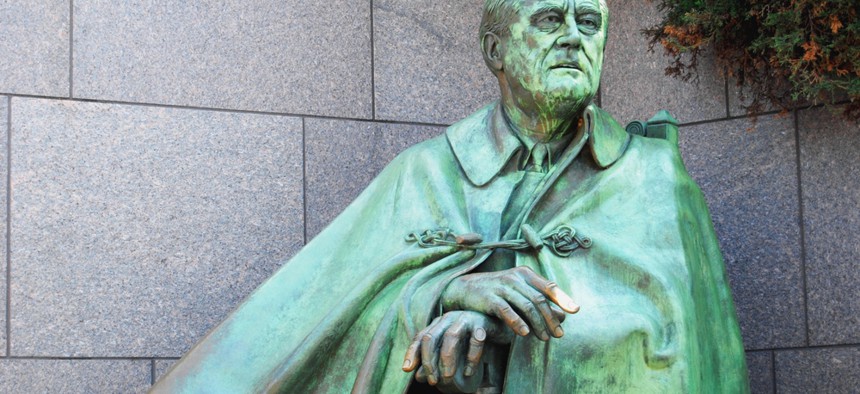
Image via Lissandra Melo/Shutterstock.com
Can Obama Dodge the Second-Term Trap?
Knowing the past is not enough. The pratfalls that vexed Obama’s predecessors weren’t always predictable.
It’s no secret that presidents struggle in years five through eight. Everybody, it seems, knows all about whatThe New York Times has called the “second-term curse.” Even President Obama volunteered on Wednesday that he is “more than familiar with all the literature about presidential overreach in second terms,” promising he is “very cautious about that.” He aimed to reassure his supporters and the country at large that he knows the history and will avoid the traps that ensnared so many of his predecessors.
That may not be good enough.
If studying history is all a president needs to assure a great second term, then Richard Nixon wouldn’t have resigned in disgrace, Bill Clinton wouldn’t have been impeached, and George W. Bush would have pushed his agenda through Congress instead of leaving office with record-low approval ratings. All three presidents intently studied the history; all three began their second terms convinced that they could avoid troubles; and all three managed to add to the second-term literature of woe.
Nixon and Clinton had similar problems. Nixon was analytical after his 1972 landslide win: “My study of elections in this country, and of second terms particularly, is that second terms almost inevitably are downhill,” he said in a speech shortly after his victory. “The tendency is for an administration to run out of steam.… The only way that historical pattern can be changed is to change not only some of the players but also some of the plays.”
Clinton, too, went to great lengths in a post-victory press conference to note that he had just read a history of second terms and knew exactly why other presidents had gone wrong. “The things which derail a second term are basically three,” Clinton said in 1996. “One is some external event intervenes, and the president can’t fulfill his dreams or hopes or his agenda…. The second thing that happens is sometimes a president thinks he has more of a mandate than he does and tries to do too much in the absence of cooperation.… And the third is that sometimes a president essentially just runs out of steam.” Knowledge led to hubris: “I think we’ll be able to avoid those pitfalls,” he said with a touch of swagger. “I’m very mindful of history’s difficulties, and I’m going to try to beat them.”
But history couldn’t protect either man from mistakes they had already made in their first terms. Watergate (and the ensuing cover-up) felled Nixon; Clinton’s affair (and possible second-term perjury) made governing nearly impossible. “The chickens come home to roost,” says presidential historian George C. Edwards III of Texas A&M University.
Overreach—a peril that Obama cited on Wednesday—can plague even the most sophisticated political thinkers. Franklin Roosevelt tried to pack the Supreme Court with cronies who would uphold his New Deal reforms and then attempted to purge conservative Democrats in his sixth-year midterm election. George W. Bush had Peter Wehner, director of the White House Office of Strategic Initiatives, prepare a study titled “2d Term/Analysis” in 2004. By outlining how earlier presidents had erred in their second terms, aides boasted, the research would allow Bush to avoid those mistakes. But it didn’t stop him from attempting to transform Social Security or ram the Supreme Court nomination of Harriet Miers through the Senate. FDR and Bush “believed their own PR,” Edwards says.
Can Obama succeed where FDR, Nixon, Clinton, and Bush—as well as Ronald Reagan and Dwight Eisenhower—fell short? Edwards believes that Obama already overreached in his first term and was punished by voters in the 2010 midterms. Partially because of that, Edwards and most of those who have studied second terms argue that this president can beat the odds.
But only if Obama figures out how to improve relations with lawmakers of both parties, according to Indiana author Alfred Zacher, who wrote the book that Clinton cited in 1996. And only if he realizes that he has much less than the full four-year term to push his agenda. “If you are going to do something big or important, do it fast. A presidential administration is like an hourglass with the sand running out,” says Stephen Hess, an emeritus fellow at the Brookings Institution who worked in the White House during Eisenhower’s second term. “There is a blip up with your second inauguration. You know the odds are that you are going to lose seats at the midterm election, and pretty soon you are going to look pretty lame-duckish, as even your supporters start to choose up sides over your successor.”
A second key for Obama is avoiding the personnel mistakes that other presidents have made when close advisers have left. Many of the newcomers tend to be less competent and less committed to the president’s agenda. Naming Donald T. Regan chief of staff and John Poindexter national-security adviser definitely caused Reagan some second-term headaches. It’s important to pick a good team, maintains John P. Burke, a political scientist at the University of Vermont who wrote a study of second terms
for the Center for the Study of the Presidency and Congress, “because we’ve seen a lot of second-term presidencies unravel because of various scandals.”
With the right people around him and a realization that, at best, he has only about a year before Congress shifts its attention to the midterms, Obama can dodge the fate that befell his predecessors. But it will take more than just being “familiar with all the literature.”
This article appeared in print as "Second-Term Trap."
This article appeared in the Saturday, November 17, 2012 edition of National Journal.
(Image via Lissandra Melo/Shutterstock.com)
NEXT STORY: OMB gets improved ratings from its own employees







